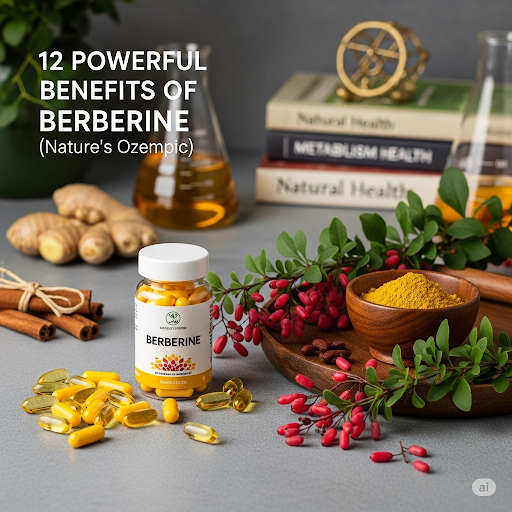The golden alkaloid that’s shaking up modern medicine naturally.
Introduction: What Exactly Is Berberine and Why Is Everyone Talking About It?
If you haven’t heard the buzz about berberine yet, let me catch you up. It’s being called Nature’s Ozempic a nickname that’s earned it serious street cred in both the natural wellness world and among clinical researchers. But don’t let the hype distract you from the real story: berberine is more than a trendy supplement. It’s a powerful compound that’s been quietly working its magic for centuries.
Berberine is a bright yellow plant alkaloid found in a variety of herbs, most notably in barberry, goldenseal, and tree turmeric. It’s been used for over 3,000 years in Ayurvedic and Traditional Chinese Medicine to treat everything from infections and digestive issues to inflammation and blood sugar imbalances.
But now, science has caught up. Modern studies are showing that this golden compound may rival some pharmaceutical drugs without the synthetic side effects. It’s no wonder people are calling it “nature’s Metformin,” “plant-based Ozempic,” and even “the multitasker supplement of the century.”
Let’s dive into the 12 powerful benefits of berberine and why adding it to your health routine might be one of the best natural decisions you make.
Berberine Dramatically Lowers Blood Sugar Levels Almost Like a Natural Metformin
If there’s one thing berberine is most famous for, it’s this: balancing blood sugar. It’s not just a casual perk it’s a full-on superpower. Multiple clinical studies have shown that berberine is just as effective as Metformin, the go-to prescription drug for type 2 diabetes, in reducing fasting blood glucose and HbA1c levels.
It works by activating an enzyme called AMPK, often called the body’s “metabolic master switch.” AMPK helps your cells absorb glucose more efficiently, improves insulin sensitivity, and reduces glucose production in the liver. This means fewer sugar crashes, less fatigue, and better long-term protection against insulin resistance.
For anyone teetering on the edge of prediabetes or already managing it berberine is a natural ally worth knowing.
It Aids Weight Loss by Activating Fat-Burning Pathways
This is where the nickname Nature’s Ozempic really kicks in. Berberine doesn’t just support blood sugar; it directly influences metabolism and encourages weight loss through multiple channels.
It helps regulate hormones like insulin and leptin, both of which play major roles in fat storage and appetite control. Berberine also activates brown fat thermogenesis a fancy term that basically means it turns up your body’s natural fat-burning furnace.
In human studies, people taking berberine lost an average of 5 pounds over 12 weeks without intense dieting or crazy workouts. The fat loss is especially notable around the belly area, making berberine a stealthy warrior in the battle against visceral fat.
Berberine Reduces Belly Fat and Improves Body Composition
Speaking of belly fat… this is the kind you really want to get rid of. It’s not just about looking good in a shirt it’s the most dangerous type of fat linked to heart disease, diabetes, and inflammation.
Berberine targets abdominal fat by regulating adiponectin, a hormone that plays a key role in how your body stores and breaks down fat. When adiponectin levels rise (which berberine encourages), your metabolism becomes more efficient, and fat cells are less likely to accumulate around your organs.
The result? Less stubborn belly bulge and better overall body composition.
It Slashes Inflammation and Oxidative Stress at the Root
If inflammation is the silent villain behind most chronic diseases, then berberine is the plant-based hero ready to take it down. It reduces inflammatory markers like CRP, TNF-alpha, and IL-6, which are elevated in conditions ranging from arthritis to autoimmune disorders to cardiovascular disease.
Berberine also acts as a potent antioxidant, helping your body neutralize free radicals that can damage cells, accelerate aging, and trigger disease. Think of it like a molecular clean-up crew sweeping through your body and putting out small fires before they become full-blown health disasters.
It Supports a Healthy Heart by Lowering Cholesterol and Triglycerides
Heart disease might be the leading cause of death worldwide, but berberine is doing its part to change that. It’s been shown to lower LDL (bad) cholesterol, reduce triglycerides, and even raise HDL (good) cholesterol a rare trifecta of heart-friendly effects.
What’s more impressive? It does this by increasing the excretion of cholesterol in bile and enhancing the expression of LDL receptors in the liver, which pull cholesterol out of circulation.
In plain English: berberine helps your body use cholesterol properly, rather than letting it hang around in your arteries, causing trouble.
Berberine May Help Lower Blood Pressure Naturally
Berberine doesn’t just help your blood sugar and fat metabolism it also supports healthy blood pressure. It works by promoting vasodilation, or the widening of blood vessels, which improves circulation and lowers vascular resistance.
It also reduces the activity of the angiotensin-converting enzyme (ACE), similar to how common blood pressure meds work but without the side effects like dizziness or chronic cough.
If your blood pressure is creeping up or you’re genetically prone to hypertension, berberine offers a natural, side-effect-free way to protect your cardiovascular system.
It Enhances Gut Health and Supports a Healthy Microbiome
Your gut is home to trillions of bacteria that influence everything from digestion to immunity to mood. When your gut flora is out of balance, inflammation spikes, and all kinds of problems emerge.
Berberine acts like a gentle antimicrobial that targets bad bacteria while sparing the good, making it a natural tool for correcting gut dysbiosis. It’s been shown to help with SIBO (Small Intestinal Bacterial Overgrowth), diarrhea-causing pathogens, and even IBS-like symptoms.
Plus, by improving gut health, berberine indirectly enhances nutrient absorption, reduces bloating, and improves immune resilience.
It May Help Prevent or Treat PCOS in Women
Polycystic Ovary Syndrome (PCOS) is a hormonal condition tied to insulin resistance, weight gain, and fertility struggles. Metformin is often prescribed but berberine is showing comparable results with fewer side effects.
Studies have found that berberine helps regulate testosterone, insulin, and luteinizing hormone levels in women with PCOS. It can also improve ovulation rates and menstrual regularity two major wins for women trying to manage symptoms or improve fertility.
It Protects the Brain and May Reduce Risk of Cognitive Decline
Here’s something exciting: Berberine crosses the blood-brain barrier and gets to work protecting your brain cells. It stimulates neurogenesis (the growth of new brain cells), reduces oxidative stress in the brain, and may even slow the buildup of amyloid plaques associated with Alzheimer’s disease.
It also helps regulate brain inflammation a growing concern in mental health conditions like anxiety, depression, and even Parkinson’s.
So yes, while berberine supports the body, it may also be one of the few natural compounds that truly nourish the mind as well.
It Has Powerful Antimicrobial and Antiviral Effects
Long before it became a modern-day metabolic marvel, berberine was used as a natural antibiotic and antifungal. It has potent activity against bacteria like E. coli, H. pylori, and even Candida making it a useful remedy for gut infections, UTIs, and yeast overgrowth.
More recently, researchers have explored its antiviral properties against viruses like influenza and herpes simplex. While it’s no replacement for antiviral drugs, berberine’s ability to modulate the immune response gives it serious bonus points in the infection-fighting department.
It Might Help You Live Longer Seriously
Here’s where things get philosophical (and scientific): AMPK, the enzyme berberine activates, is also linked to longevity. It mimics the effects of fasting and caloric restriction two well-known pathways to longer life in various animal models.
AMPK activation supports cellular cleanup, energy efficiency, and reduced age-related disease risk. By triggering these processes, berberine may help slow the biological aging clock and who wouldn’t want that?
It’s not a magic pill, but it’s a mighty little molecule doing some seriously impressive anti-aging work behind the scenes.
Final Takeaway: Is Berberine Worth the Hype?
In one word: Yes.
Berberine isn’t just another supplement it’s a plant-based powerhouse that touches nearly every system in your body. From blood sugar and weight loss to heart health, brain protection, and gut repair, this golden alkaloid earns its title as Nature’s Ozempic and so much more.
But here’s the thing: Berberine isn’t a quick fix. It’s most effective when paired with healthy eating, movement, sleep, and consistency. It also needs to be taken in divided doses (usually 500mg, 2–3 times a day), as it has a short half-life.
If you’re already on medications (especially for diabetes or blood pressure), it’s wise to talk to your doctor before starting berberine. It’s potent, and combining it with certain drugs can amplify their effects a little too well.
But for many people, berberine could be the gentle, natural nudge your body’s been waiting for one that works with your system instead of against it.












